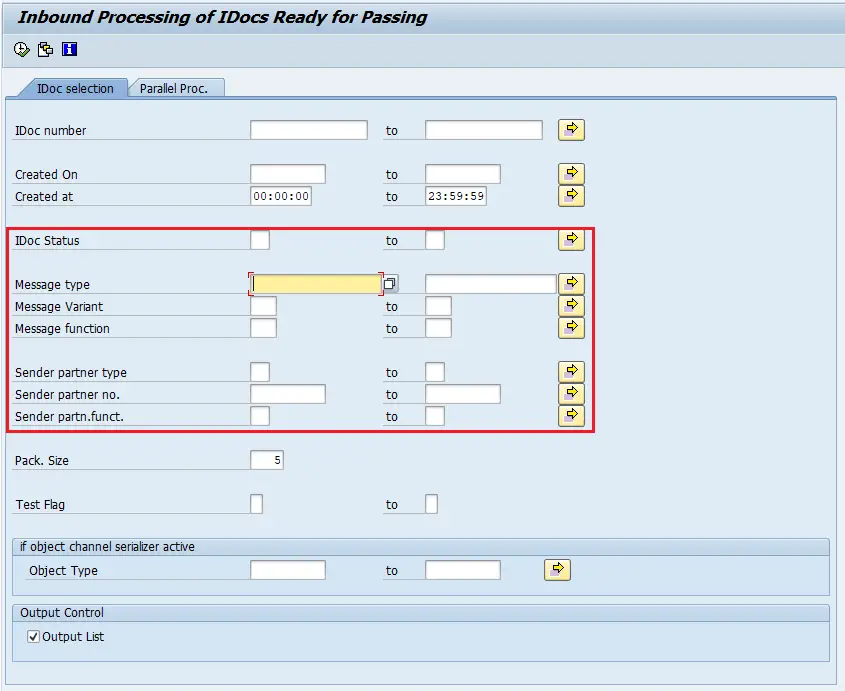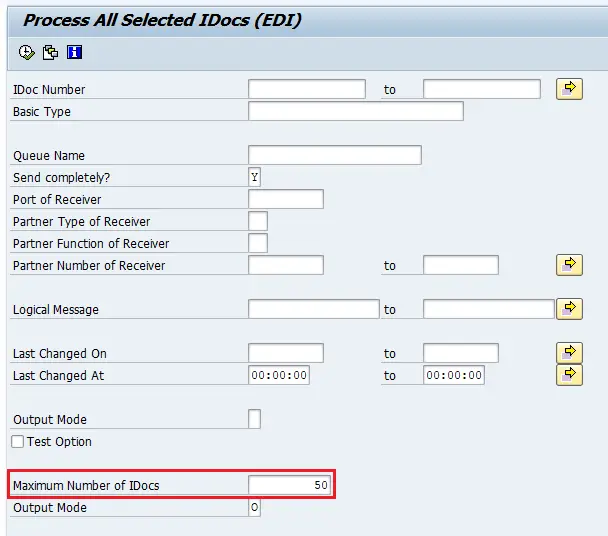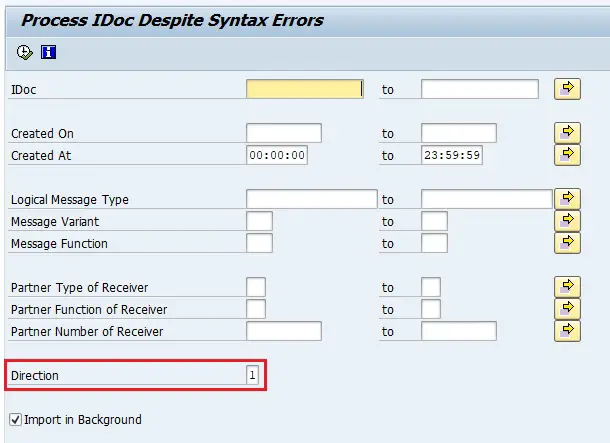There is a vast number of transactions and standard programs that should be used to configure an ALE/iDoc integration scenario. In addition, there are multiple programs and transactions that are useful for day-to-day operations of ALE/EDI layer. For example process Inbound and Outbound iDocs by standard programs, archive old iDocs, change the status of iDocs, etc. The aim of this post is to consolidate a list of these standard programs provided by SAP and their functionalities.
SAP ALE/iDoc processing and re-processing Programs we will discuss in this tutorial,
- RBDAPP01 – Inbound Processing of IDocs Ready for Passing
- RBDMANI2 – Manual Processing of IDocs: Post IDocs Not Yet Posted
- RSEOUT00 – Process All Selected IDocs (EDI)
- RSETESTD – Delete IDocs
- RC1_IDOC_SET_STATUS – EHS: Report for Converting IDoc Status (Internal EHS Purposes Only)
- RBDMANIN – Reprocess iDocs in status 51
- RBDAGAIN – Reprocess Outbound iDocs in Error
- RBDMIDOC – Create iDocs from Change Pointers
- RBDSYNER – Process IDoc Despite Syntax Errors
- RBDAGAIE – Reprocessing of Edited IDocs
SAP Versions used in the illustration:
- SAP S4 HANA Fashion 1709
1. RBDAPP01 – Inbound Processing of IDocs Ready for Passing
RBDAPP01 is one of the most important programs. The program processes Inbound iDocs in yellow states, such as status 64 (IDoc ready to be passed to application).

Usually, this program is scheduled as a background job to process Inbound iDocs automatically. Standard practice is to create separate jobs for each Message Type, iDoc Type, and Partner combination with other selection criteria depending on your organizational needs. Make sure to include a list of ‘iDoc Statuses‘ in the background program variant also. Background mode is the preferred way to process Inbound iDocs. To set the iDoc processing in Background mode, Partner Profile configuration should be maintained as ‘Trigger by Background Program‘.

It is essential to avoid batch jobs of the program RBDAPP01 for the same variant from being overlapped. Overlapping usually occurs when batch jobs are scheduled at a high frequency and processing of one instance of the job does not finish before the start of the next instance of the job. In case parallel jobs are started, there will be irregular behaviors in iDoc processing.
Parallel Processing of iDocs batches can be activated by filling in the Parallel Processing parameters. (This is not the same as what we discussed previously about overlapping batch jobs)

Select the ‘Parallel Proc. Active’ checkbox to activate parallel processing and assign the ‘Server Group’.
2. RBDMANI2 – Manual Processing of IDocs: Post IDocs Not Yet Posted
This program is useful to re-process Inbound iDocs which are in an error status. Usually, when an inbound iDoc is not posted successfully, it will go into an error status of 51 (Application document not posted). Schedule a Batch job with program RBDMANI2 which runs periodically to process error iDocs automatically.
Notice the program does not have a selection parameter for iDoc Status. The program considers all iDocs in error status 51.
3. RSEOUT00 – Process All Selected IDocs (EDI)
This is another important program that processes iDocs in yellow status. RSEOUT00 is similar to the program RBDAPP01, but it processes Outbound iDocs. When you configure an Outbound iDoc to be processed by ‘Trigger by Background Program’ in Partner Profile (we20), the iDocs created will be in a status 30 (IDoc ready for dispatch (ALE service).
Program RSEOUT00 processes iDocs created in status 30 and pass them to Outbound Port. If the iDoc is processed successfully from the program it will be converted from status 30 to status 03 (Data passed to port OK).
This program is also usually scheduled as a Background Job to process Outbound iDocs generated from different SAP processors.
One important parameter to notice is the ‘Maximum number of iDocs‘. When you transfer multiple iDocs to the Port at the same time as a batch, this parameter defines the maximum number of iDocs added before the Commit Work. If the number is too large it might result in short dumps and time-outs of the process. When iDoc size is large, set the ‘Maximum Number of iDocs’ to a lower amount to avoid this issue. For example, Article (Material) Master ARMAS iDocs are quite large, while Price Condition (COND_A) iDocs are smaller in size. Therefore, ‘Maximum number of iDocs’ parameter should be set to a lower number like 10-50 for ARTMAS, while COND_A iDocs should be set to 500.

4. RSETESTD – Delete IDocs
As the name suggests, use this program to delete iDocs from the system. Depending on the retention period of iDocs of your organization you can schedule this as a background job. The program will remove the iDoc data from the system and clear EDIDC, EDIDS, and other standard iDoc tables.
The same program RSETESTD can be accessed using standard transaction we11.
5. RC1_IDOC_SET_STATUS – EHS: Report for Converting IDoc Status (Internal EHS Purposes Only)
Use this program to change the status of an iDoc manually. You can read all about program RC1_IDOC_SET_STATUS – EHS in this tutorial I have written previously.
In a production environment, this program is mostly used to set the iDocs that should not be processed again to status 68 (no further processing).
6. RBDMANIN – Reprocess iDocs in status 51
Program RBDMANIN re-processes Inbound iDocs which have errors. This is a wrapper-program for iDoc re-processing program RBDMANI2 we discussed above.
7. RBDAGAIN – Reprocess Outbound iDocs in Error
RBDAGAIN is similar to program RBDMANI2 which is used for iDoc reprocessing of Inbound iDocs. But the program RBDAGAIN re-processes Outbound iDocs in error status. RBDAGAIN is also periodically scheduled as a background job to automatically re-process Outbound iDocs with errors.
8. RBDMIDOC – Create iDocs from Change Pointers
This program is used to create Master and Communication iDocs from Change Pointers. This program reads data from Change Pointer table and processes them to create iDocs. Check my previous tutorial on a step-by-step guide on SAP Change Pointers configuration for more information on this program.
9. RBDSYNER – Process IDoc Despite Syntax Errors
Program RBDSYNER re-processes iDocs which are in a syntax error status. Unlike other programs we discussed above, this program can process both Inbound and Outbound iDocs. You can select the iDoc direction in Selection Screen using the parameter ‘Direction’.

The program re-processes Outbound iDocs in status 26 (Error during syntax check of IDoc (outbound)) and Inbound iDocs in status 60 (Error during syntax check of IDoc (inbound)).
10. RBDAGAIE – Reprocessing of Edited IDocs
This program processes iDocs which were manually edited. Inbound-edited iDocs in status 69 (IDoc was edited) and Outbound iDocs in status 32 (IDoc was edited) are processed in this program. Usually, the user can edit iDocs with transactions we02 or we05.
If you have worked with other standard programs that are not mentioned here or if you have any questions, let me know in comments!

Good information, handy
Thank you Krishna! 🙂
Very helpful. Thank you for sharing.
Thank you very much! Checkout my complete course on SAP Integration Suite here.